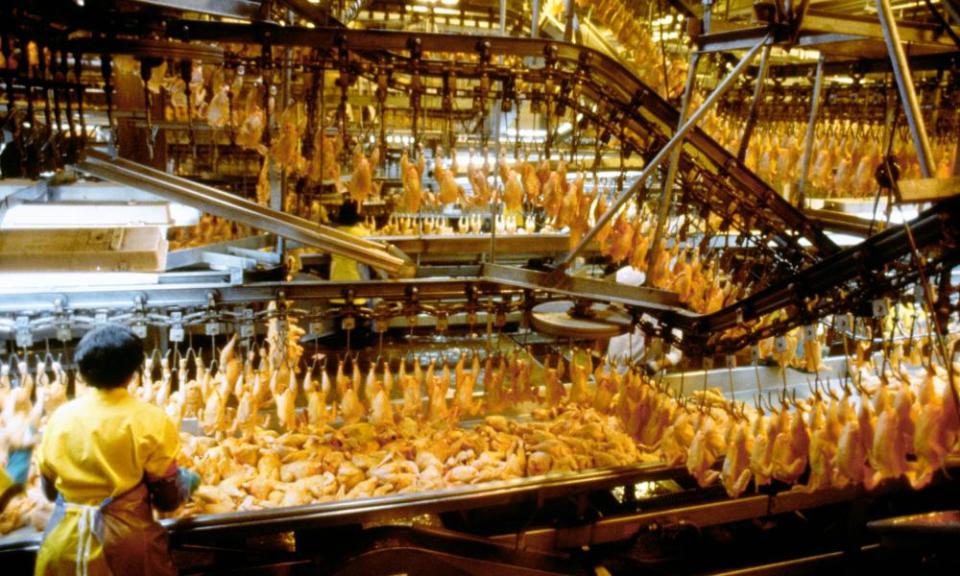UK ministers gain power to allow lower-standard food imports

Ministers will be able to approve the import of animal and agricultural products of a lower standard than currently permitted in the UK, after attempts to amend the trade bill failed.
The government has repeatedly vowed not to allow the import of chlorinated chicken and hormone-treated beef, but has refused to sign those pledges into law.
The House of Lords put forward amendments to the trade bill that would have required future trade agreements to be scrutinised by parliament, with a view to ensuring standards are retained, but the key amendment fell on Tuesday night by 353 votes to 277.
Campaigners said the new post-Brexit arrangements for food imports and food production standards in the UK would allow ministers to make sweeping changes to existing food safety regulations without consultation.
Many products could be affected. For instance, while the government has said it will not allow chlorinated chicken, meat can be washed in a variety of other substances that have similar effects: peracetic acid, cetylpyridinium chloride, acidified sodium chlorite, or organic acid rinses.
Chicken treated with bleach and similar substances can retain some pathogens, according to research, and campaigners also fear that such treatment is used to disguise infections caused by animals being kept in poor conditions that would be illegal in this country.
In the debate, the government sought to reassure MPs that there were sufficient safeguards to ensure the UK’s standards were kept high.
However, there was disagreement. Jonathan Djanogly, one of a small number of Conservative MPs who voted against the government, said: “Ministers suggest that a pre-signature vote [on a trade deal] would make them look less decisive and weaken their hand, but I would suggest that the opposite is actually the case. In the US, negotiations are often strengthened by the executive suggesting that Congress won’t accept such-and-such a proposal.”
He added: “The power of approval that was given to MEPs now needs to come back here to parliament, not to be forgotten by ministers. Having proper scrutiny votes will go towards establishing the UK as a modern, democratic, confident, international trading nation, and we should be embracing that.”
Campaigners pointed to loopholes in the government’s regulations that mean food standards can be altered without consultation or fanfare. They said the rules would make it difficult to even find out whether standards had been lowered.
Watch: 10 ways to Brexit proof your finances
For instance, the list of approved antibiotics for livestock – a vital issue, because the overuse of antibiotics on livestock is a key driver of the growth of antibiotic resistance that threatens human medicine – can be changed without notice, and only close retrospective scrutiny would reveal the changes.
Kierra Box, a campaigner at Friends of the Earth, said: “MPs have voted to lock themselves out of decisions on future trade deals. These deals will have a far bigger impact than changing the contents of our supermarket shelves. They could make it harder to pass new legislation to protect our environment, increase the UK’s contribution to climate change, or prop up supply chains linked to human rights abuses. It’s not just disappointing that our elected representatives are willing to let themselves and their constituents be satisfied – it’s mystifying.”
Debbie Tripley, the director of environmental policy and advocacy at WWF-UK, said: “The government’s approach to trade risks undermining their ambition to be a global green leader. Ministers should not have powers to remove important protections via loophole, nor push future trade deals through parliament without meaningful scrutiny.”
Recent research suggests the government may run into trouble with its “red wall” voters if food standards are lowered in trade deals. Qualitative research among focus groups of 52 first-time Conservative voters in red wall constituencies, carried out by Unchecked UK in partnership with KSBR Brand Futures, found strong support for stringent food standards.
Watch: Is it time for the four-day work week?

 Yahoo Finance
Yahoo Finance 